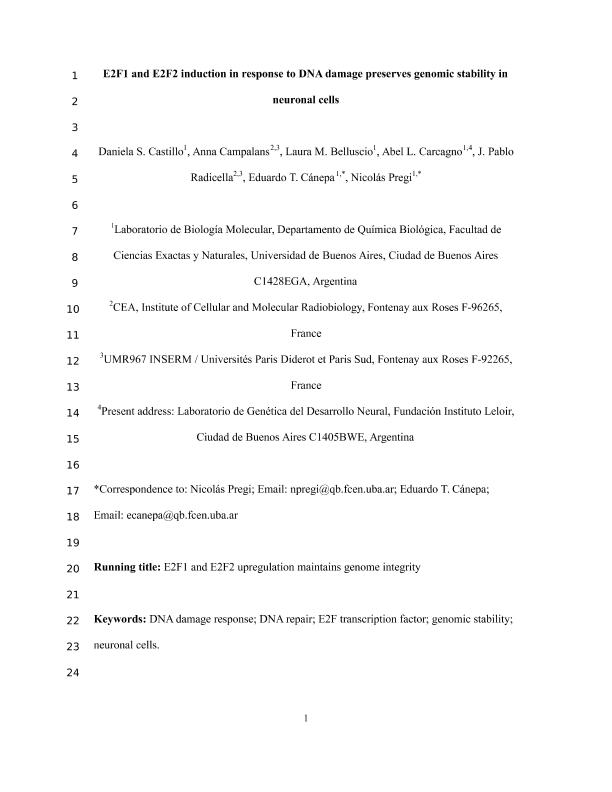Mostrar el registro sencillo del ítem
dc.contributor.author
Castillo, Daniela Susana

dc.contributor.author
Campalans, Anna
dc.contributor.author
Belluscio, Laura María

dc.contributor.author
Carcagno, Abel Luis

dc.contributor.author
Radicella, J. Pablo
dc.contributor.author
Canepa, Eduardo Tomas

dc.contributor.author
Pregi, Nicolás

dc.date.available
2018-01-16T18:18:29Z
dc.date.issued
2015-04
dc.identifier.citation
Castillo, Daniela Susana; Campalans, Anna; Belluscio, Laura María; Carcagno, Abel Luis; Radicella, J. Pablo; et al.; E2F1 and E2F2 induction in response to DNA damage preserves genomic stability in neuronal cells; Taylor & Francis; Cell Cycle; 14; 8; 4-2015; 1300-1314
dc.identifier.issn
1538-4101
dc.identifier.uri
http://hdl.handle.net/11336/33446
dc.description.abstract
E2F transcription factors regulate a wide range of biological processes, including the cellular response to DNA damage. In the present study, we examined whether E2F family members are transcriptionally induced following treatment with several genotoxic agents, and have a role on the cell DNA damage response. We show a novel mechanism, conserved among diverse species, in which E2F1 and E2F2, the latter specifically in neuronal cells, are transcriptionally induced after DNA damage. This upregulation leads to increased E2F1 and E2F2 protein levels as a consequence of de novo protein synthesis. Ectopic expression of these E2Fs in neuronal cells reduces the level of DNA damage following genotoxic treatment, while ablation of E2F1 and E2F2 leads to the accumulation of DNA lesions and increased apoptotic response. Cell viability and DNA repair capability in response to DNA damage induction are also reduced by the E2F1 and E2F2 deficiencies. Finally, E2F1 and E2F2 accumulate at sites of oxidative and UV-induced DNA damage, and interact with γH2AX DNA repair factor. As previously reported for E2F1, E2F2 promotes Rad51 foci formation, interacts with GCN5 acetyltransferase and induces histone acetylation following genotoxic insult. The results presented here unveil a new mechanism involving E2F1 and E2F2 in the maintenance of genomic stability in response to DNA damage in neuronal cells.
dc.format
application/pdf
dc.language.iso
eng
dc.publisher
Taylor & Francis

dc.rights
info:eu-repo/semantics/openAccess
dc.rights.uri
https://creativecommons.org/licenses/by-nc-sa/2.5/ar/
dc.subject
E2f
dc.subject
Dna Damage
dc.subject
Stress
dc.subject
Genomic
dc.subject.classification
Otras Ciencias Biológicas

dc.subject.classification
Ciencias Biológicas

dc.subject.classification
CIENCIAS NATURALES Y EXACTAS

dc.title
E2F1 and E2F2 induction in response to DNA damage preserves genomic stability in neuronal cells
dc.type
info:eu-repo/semantics/article
dc.type
info:ar-repo/semantics/artículo
dc.type
info:eu-repo/semantics/publishedVersion
dc.date.updated
2018-01-12T19:47:32Z
dc.journal.volume
14
dc.journal.number
8
dc.journal.pagination
1300-1314
dc.journal.pais
Reino Unido

dc.journal.ciudad
Londres
dc.description.fil
Fil: Castillo, Daniela Susana. Universidad de Buenos Aires. Facultad de Ciencias Exactas y Naturales. Departamento de Química Biológica. Laboratorio de Biología Molecular; Argentina. Consejo Nacional de Investigaciones Científicas y Técnicas; Argentina
dc.description.fil
Fil: Campalans, Anna. Inserm; Francia
dc.description.fil
Fil: Belluscio, Laura María. Universidad de Buenos Aires. Facultad de Ciencias Exactas y Naturales. Departamento de Química Biológica. Laboratorio de Biología Molecular; Argentina. Consejo Nacional de Investigaciones Científicas y Técnicas; Argentina
dc.description.fil
Fil: Carcagno, Abel Luis. Universidad de Buenos Aires. Facultad de Ciencias Exactas y Naturales. Departamento de Química Biológica. Laboratorio de Biología Molecular; Argentina. Consejo Nacional de Investigaciones Científicas y Técnicas; Argentina
dc.description.fil
Fil: Radicella, J. Pablo. Inserm; Francia
dc.description.fil
Fil: Canepa, Eduardo Tomas. Universidad de Buenos Aires. Facultad de Ciencias Exactas y Naturales. Departamento de Química Biológica. Laboratorio de Biología Molecular; Argentina. Consejo Nacional de Investigaciones Científicas y Técnicas; Argentina
dc.description.fil
Fil: Pregi, Nicolás. Universidad de Buenos Aires. Facultad de Ciencias Exactas y Naturales. Departamento de Química Biológica. Laboratorio de Biología Molecular; Argentina. Consejo Nacional de Investigaciones Científicas y Técnicas; Argentina
dc.journal.title
Cell Cycle

dc.relation.alternativeid
info:eu-repo/semantics/altIdentifier/doi/http://dx.doi.org/10.4161/15384101.2014.985031
dc.relation.alternativeid
info:eu-repo/semantics/altIdentifier/url/http://www.tandfonline.com/doi/full/10.4161/15384101.2014.985031
Archivos asociados
